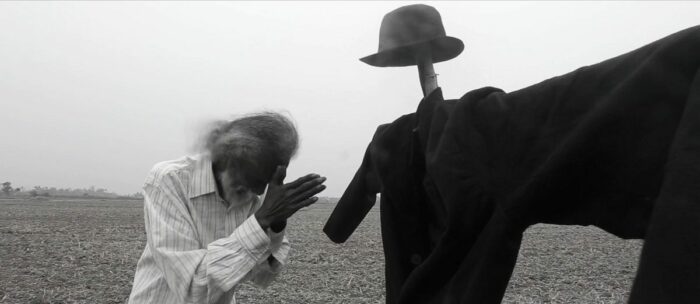Adieu, Godard, the new film from writer-director Amartya Bhattacharyya and producer Swastik Choudhury, pays homage to the work of French Nouvelle Vague auteur Jean-Luc Godard in the unlikeliest of ways and surprising of settings. In a remote and deeply conservative village in India, an old man stumbles across a pirated DVD of Godard’s Breathless (A bout de souffle) and devotes himself to organizing a festival of his works for his village. Not everything works—either in his plans or in the film more broadly—but the tale is told with such effervescent charm and style it’s a winner nonetheless.
Ananda (Choudhury Bikash Das) doesn’t exactly set out to seek an education in world cinema. His desires are, shall we say, baser in nature. Each week he rents porn on DVD from a local merchant to watch with his buddies, who are, like the old man himself, thrilled by the images. Less so is Ananda’s wife (Swetapadma Satpathy), who suffers an illness as he watches, and his intellectual daughter, Shilpa (Sudhashri Madhusmita), who aspires to a life beyond the village and her father’s base obsessions.
One day, the DVD Ananda rents disappoints his friends: it turns out to be not their typical moan-and-groan porno but, randomly, a pirated copy of Breathless, Godard’s 1960 cinema-changing debut. As one might imagine, Godard’s oddly-cut crime tale, with characters fully dressed and prone to meandering conversations, fails to arouse Ananda’s buddies. Where’s the nudity? Where’s the sex? Where’s the action? Everything the men are used to and expect is confounded by Godard’s anti-narrative, experimental approach to filmmaking. The scene is a gem, with Martin Solal’s jazzy Breathless score now comically punctuating the men’s sobered disappointments.
Yet Ananda himself is fascinated, realizing that in cinema, nearly anything is possible. It’s in a way—and in a different time and place—not all that different from the realizations that Godard himself and his contemporaries brought to the medium some 60-plus years ago. That the standard way was not the only way, that film could tell nearly any story with verve and panache. Fueled more by a passion for cinema and a thirst for knowledge than by technical competence, Godard sought to expand what cinema was and meant (and, largely, he succeeded). Ananda is inspired: even if he doesn’t fully comprehend Breathless‘s jump cuts, leitmotifs, or influences—or for that matter, even its native French nor its English subtitles—he’s determined to learn more.

Fueled by this newfound curiosity, Ananda tracks down more of Godard’s films and even implores his friends to organize a Godard film festival in their village. Absurd as it sounds, they agree to do so, despite the technical and logistical difficulties they encounter. In a parallel storyline set some years later, Ananda’s daughter Shilpa narrates these same events to her new boyfriend Pablo (Abhishek Giri), an aspiring filmmaker: her and his understandings of those events diverge dramatically in a uniquely Godardian touch. Years ago, she’d faced expulsion from the village for a rumored tryst with a local boy, an event Bhattacharyya uses to illustrate the casual-yet-rabid sexism of the village.
It’s a point well made, as Shilpa faces discrimination the boy does not, and even later, she is determined to make her own choices in life, rather than let society dictate her options. The scenes shot in dialogue between her and Pablo as she narrates to him the earlier events, are shot in color, with a stilted, awkward composition, a meta-commentary on Ananda’s fascination with porn and Godard. These conversations, while they may on the surface resemble those between, say, Brigitte Bardot and Michelle Piccoli in Godard’s Le Mepris, rehashing an earlier interaction, offer little of Godard’s unique frisson.

The village scenes are shot, predominantly, in a luminous, finely detailed black and white cinematography that highlights every distinct crease of Choudhury Bikash Das’s magnificently aged visage. (Director and writer Bhattacharyya also shot, and edited, the film.) While the actor may be prone to some exaggerated expression, his portrayal of Ananda is inspiring. The old man has ignored his wife and failed his daughter in his obsession with porn, and his newfound passion for learning ignites a spark that promises to resuscitate his failed interpersonal relationships.
Yet can a conservative village embrace a film festival comprised of content by a self-avowed anarchist with an intellectual streak? How will villagers respond when their naïve expectations are confounded? Even in contemporary America, where communities have become obsessed with banning books and legislatures are busy dictating the limits of classroom content to teachers, we’ve seen an open, vicious hostility to any cultural material that might be thought to offend. Adieu, Godard brilliantly illustrates the folly of such close-mindedness, though that lesson comes at a high cost to Ananda and his friends.
Like in the film’s narrative of a quest to bring Godard to the village, not everything in Adieu, Godard works. The meta-commentary from Shilpa pales considerably in comparison to the vibrance of the village scenes. And while Ananda’s quest is shot with an elegant aesthetic, the editing often (intentionally, I assume) leaves Bikash Das alone onscreen, cut against his peers in ways that seem less than organic. Last, for a film that purports to be enough of an homage to Godard to warrant naming itself after him, there is precious little of Godard here: only Breathless appears, and no overt mention of any of his 100-plus other films: no Alphaville, no Pierrot Le Fou, no Week-End, no Tout va bien.
Those are hardly damning criticisms, though. In fact, a film with some stilted dialogue or curious editing may well appease Godard himself. And a little Godard is better than none! The filmmaker is still active in his 90s, raising new ideas and delaying his retirement, more than 60 years after having changed cinema forever with Breathless. The world has yet to say Adieu to Godard, but with this charming homage, Amartya Bhattacharyya and Swastik Choudhury have bid the director a heartfelt, unassuming, and lovely fare-thee-well.



